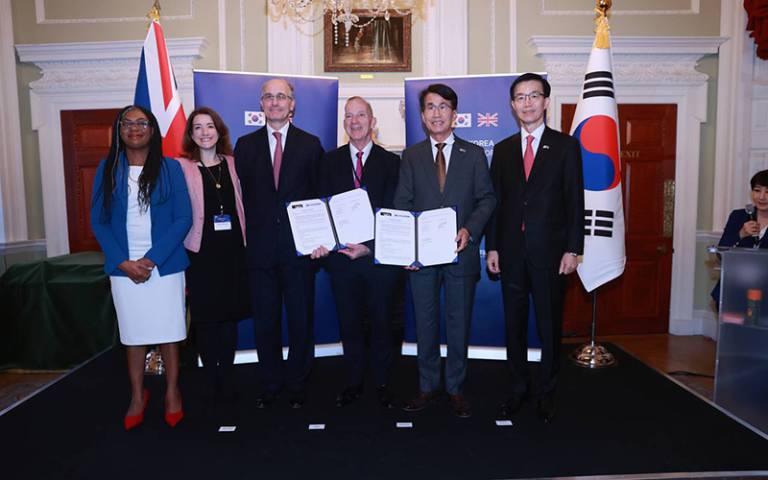UCL and Hyundai Motor Company have agreed to jointly research hydrogen production, fuel cells and electrification technologies, leveraging UCL's new Advanced Propulsion Lab.

Announcing the partnership to research carbon-neutral future technologies, the two parties signed a memorandum of understanding (MOU) on 'Cooperation in areas of Research and Development for Hydrogen Production, Hydrogen Fuel Cells and Electrification Technology' at Mansion House in London on 22 November 2023.
The MOU signing ceremony took place prior to the start of the top-level UK-Korea Business Forum. In attendance were government officials from both countries, including Moon-kyu Bang, South Korea's Minister of Trade, Industry and Energy; and Nigel Huddleston, UK Secretary of State for International Trade; as well as Dong-wook Kim, Executive Vice President of Hyundai Motor Company; and Dr Michael Spence, President and Provost of UCL.
With both South Korea and the UK aiming to achieve carbon neutrality by 2050, Hyundai Motor looks to accelerate the development of a hydrogen economy and realise a sustainable future mobility ecosystem through this MOU and continued research and development of eco-friendly technologies.
Jaehoon (Jay) Chang, President and CEO of Hyundai Motor Company, said: "Through joint research with UCL, one of the UK's leading research universities, we will accelerate the pace of technological innovation in hydrogen production, fuel cells and electrification. We hope that this collaboration will contribute to achieving carbon neutrality in the transportation sector, which is a goal shared by Korea and the UK."
Alongside the research into future mobility technologies, the two organisations also expect research collaboration on advanced materials, proprietary technologies and basic industrial technologies to be possible.
UCL's new Advanced Propulsion Lab, located on the UCL East campus in Stratford, is to play a pivotal role in these research areas.
UCL President and Provost, Dr Michael Spence said, "New technologies, such as hydrogen generation, electric vehicles and fuel cells, are a fundamental part of international efforts to keep the global temperature rise within the goals set out in the Paris Agreement. This partnership will combine UCL's world-leading engineering research with Hyundai's expertise as one of the world's leading automotive companies to accelerate the development of these vital technologies."
The two parties also aim to strengthen collaboration on joint carbon reduction research projects, in line with their commitments on sustainability. In 2019, UCL ambitiously committed to achieving net zero-carbon by 2030 and to reduce energy by 40%, while Hyundai Motor has committed to achieve carbon neutrality by 2045.






